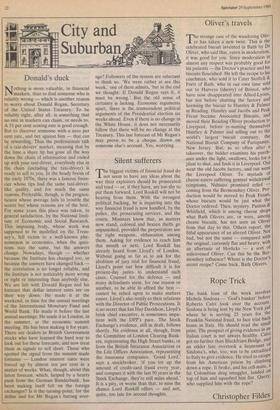City and
Donald's duck
Mothing is more valuable, in financial 1 markets, than to find someone who is reliably wrong — which is another reason to worry about Donald Regan, Secretary of the United States Treasury. To be reliably right, after all, is something that no one in markets can claim, or needs to. A 51 per cent scoring rate is good enough. But to discover someone with a zero per cent rate, and bet against him — that can be rewarding. Thus the professionals talk of a taxi-drivers' market, meaning that by the time a share tip has gone all the way down the chain of information and ended up with your taxi-driver, everybody else in the chain (including the taxi-driver) is ready to sell to you. In the heady boom of the early 1970s, there was a famous finan- cier whose tips had the same taxi-driver- like quality, and for much the same reasons. Preferable, though, is the prognos- ticator whose average fails to trouble the scorer but whose reasons are of the best. For some years this place was taken, to general satisfaction, by the National Insti- tute of Economic and Social Research. This imposing body, whose work was supposed to be modelled on the Treas- ury's, fell victim to a well-known phe- nomenon in economics, when the ques- tions stay the same, but the answers change. Nowadays, though — whether because the Institute has changed too, or because the answers have changed back the correlation is no longer reliable, and the Institute is not noticeably more wrong or right or interesting than anybody else. We are left with Donald Regan and his forecast that dollar interest rates are on their way down. He made it at the weekend, in time for the annual meetings of the International Monetary Fund and World Bank. He made it before the last annual meetings. He made it in London, in the summer, at the economic summit meeting. He has been making it for years. There are dealers in British Government stocks who have learned the hard way to look out for these forecasts, and now treat them as signals to sell short. Those who spotted the signal from the summit made fortunes — London interest rates were forced up by almost ten per cent in a matter of weeks. What, though, about this latest forecast, which, helped by a hearty push from the German Bundesbank, has been making itself felt on the foreign exchanges? Is it the turning-point, for the dollar and for Mr Regan's batting aver- age? Followers of the system are reluctant to think so. 'We were rather at sea this week,' one of them admits, 'but in the end we thought: If Donald Regan says it, it must be wrong.'. But the old sense of certainty is lacking. Economic arguments apart, there is the transcendent political arguments of the Presidential election six weeks ahead. Even if there is no change in the White House, it does not necessarily follow that there will be no change at the Treasury. This last forecast of Mr Regan's may prove to be a cheque drawn on someone else's account. Yes, worrying.














































 Previous page
Previous page